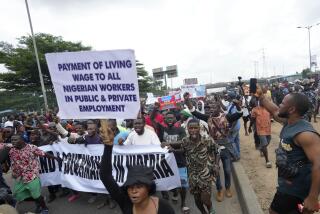Deadly Violence, Riots Continue to Jolt Nigeria
- Share via
LAGOS, Nigeria — Trying to quell ethnic violence that left nine bodies in the streets, riot police took up positions around mosques Friday while gangs of youths set fires, smashed windows and blocked roads.
Three days after the death of the country’s most prominent political prisoner, Moshood Abiola--a southern ethnic Yoruba--waves of rioting and violence appear to be pitting Yorubas against Nigeria’s northern Hausa Muslims.
For the third straight day, youths rioted Friday in parts of Nigeria’s commercial capital, Lagos. That violence had ended by late afternoon, but streets in some neighborhoods remained tense and were monitored by scores of police and soldiers. Officers in helmets and flak jackets milled around mosques.
More than 400 people have been arrested since Tuesday night, when violence first broke out in Lagos after Abiola’s death. Police say at least 55 people have been killed.
Abiola, a wealthy ethnic Yoruba businessman and opposition leader, died while discussing with a U.S. delegation terms for his release from four years of incarceration.
Abiola, 60, was widely believed to have won a presidential vote in 1993, which the military junta annulled.
The government says he died of a heart attack, but his supporters believe that he was killed by the military junta. Many members of Abiola’s family also said they believe that he was killed.
Violence between Hausas and the predominately Christian Yorubas also was tearing at the southwestern city of Ibadan, long an enclave of anti-government sentiment.
Nigerian authorities fear the political violence is being inflamed by Hausa-Yoruba enmity. That antagonism was born after Nigeria’s 1960 independence from Britain, when northerners quickly took control of the country. They have held power ever since, except for a period of about four years when southerners were in control.
These days, Nigeria’s pro-democracy movement is largely led by southerners, particularly Yorubas.
While Nigeria is a confused grid of more than 250 ethnic groups, it is dominated by Hausas and Fulanis in the north, Yorubas in the southwest, and Ibos in the southeast.
More to Read
Sign up for Essential California
The most important California stories and recommendations in your inbox every morning.
You may occasionally receive promotional content from the Los Angeles Times.












